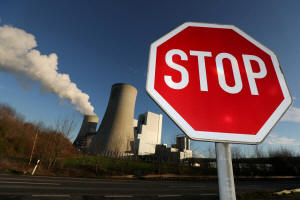Germany's biggest power producer RWE to phase out coal by 2030
 Send a link to a friend
Send a link to a friend
 [October 04, 2022] By
Christoph Steitz, Paul Carrel and Vera Eckert [October 04, 2022] By
Christoph Steitz, Paul Carrel and Vera Eckert
BERLIN/FRANKFURT (Reuters) - Germany's
largest power producer RWE said on Tuesday it is bringing forward its
coal phase-out by eight years and is ready to end lignite-based
electricity generation in 2030 as part of a deal reached with the
government.
However, faced with a Europe-wide energy crisis after Russia slashed gas
deliveries following its invasion of Ukraine, RWE said it would
temporarily boost its use of power plants fuelled by heavily polluting
lignite, or brown coal.
"In the current crisis, we are contributing to security of supply in
Germany by temporarily increasing the use of our lignite-fired power
plants, and are thus also helping to displace gas from electricity
generation," Chief Executive Markus Krebber said in a statement.
"At the same time, we are investing billions of euros to accelerate the
energy transition and are ready to phase out lignite by 2030," he added.

Krebber said the company would not request additional compensation for
moving the phase-out date forward beyond the 2.6 billion euros ($2.6
billion) it was promised under the previous plan.
The German government in November agreed to "ideally" bring forward the
country's exit from coal-fired power generation to 2030, compared with a
previous goal of 2038, but that plan still required negotiations with
the individual operators.
[to top of second column] |

A Stop sign stands in front of the
Neurath lignite power plant of German utility RWE, west of Cologne,
Germany, January 16, 2020. REUTERS/Wolfgang Rattay

As part of the move, the decommissioning of RWE's Neurath D and E
power plant units, originally scheduled for the end of this year,
will be deferred until March 31, 2024 and remain on the market as
previously communicated.
Berlin has until 2023 to extend the lifetimes or to transfer the
units to a power plant reserve, with both options limited until
March 31, 2025.
To safeguard security of supply beyond 2030, the German government
can also decide by 2026 to keep RWE's last lignite-fired plants,
with a combined capacity of 3.6 gigawatt (GW), on standby until the
end of 2033.
These are Niederaussem K and H, and Neurath F and G.
To offset the impact on the region, RWE aims to build 3 GW of
gas-fired power plant capacity that is also ready to run on
hydrogen, adding it was earmarking coal-fired power plant sites in
North Rhine-Westphalia, where RWE is based, for that.
($1 = 1.0132 euros)
(Reporting by Christoph Steitz, Paul Carrel and Vera Eckert; Writing
by Miranda Murray; Editing by Rachel More and Jan Harvey)
[© 2022 Thomson Reuters. All rights
reserved.]
This material may not be published,
broadcast, rewritten or redistributed.
Thompson Reuters is solely responsible for this content. |